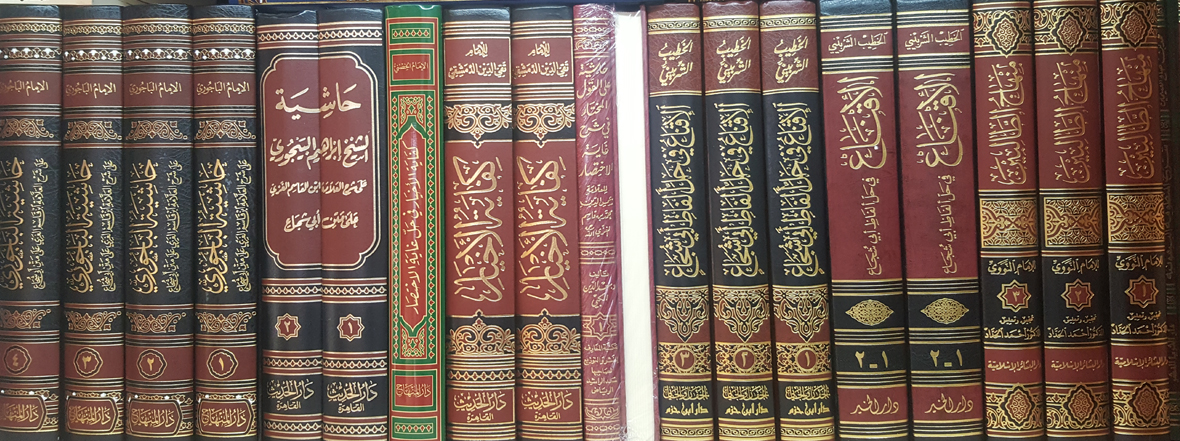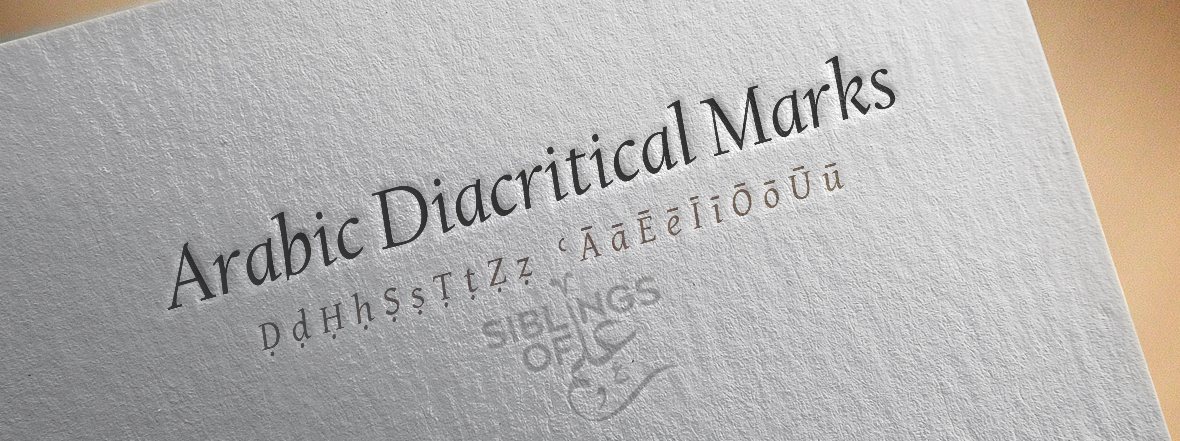In order to comfortably read Arabic texts without the need for diacritical marks, one must master the rules pertaining to Naḥw and Ṣarf before embarking on the reading journey. Not only is it an imperative to familiarise oneself with all the rules of grammar, but to be able to apply them into real literature and produce one’s own prose is of more importance. Therefore, it would not be incorrect to say the ability to read Arabic poetry and prose without diacritical marks is a skill acquired, not a science studied.
To reach such a stage, below is a suggested reading list which has been prepared upon request by a student of knowledge.
Note: The list will exclude any non-Arabic primers; the following list has been written for those who already have previous, albeit basic, knowledge of the fundamental Arabic sciences.
- Sharḥ Qaṭr al-Nadā by Ibn Hishām al-Anṣārī ؒ: This brilliant book will assist in revising and refreshing your previously-learnt rules of grammar, while simultaneously allowing you to implement them into one’s readings. Since you will already be familiar with a significant amount of their contents, it is only a matter of increasing your knowledge of the science while exposing oneself to the Arabic style. It is one thing to be able to write/say things in Arabic; it is another thing to know how the native speakers express the very same ideas. Should this be too difficult, you may study other simpler books first.
- Qiṣaṣ al-Nabīyyīn by Shaykh Abū ’l-Ḥasan ʿAlī al-Nadwī ؒ: With a dictionary at hand, this is a very enjoyable book to study; the author had written it for young students of Arabic. In addition to equipping yourself with the skill to read and understand basic Arabic literature, the book also educates you about the lives and mission of all the Prophets mentioned in the Holy Qurʾān.
- Al-Mukhtaṣar by al-Qudūrī ؒ: Do not let the honorary status of this great work put you in awe. Among the brilliance of this book is its surprisingly easy text: although such subjects need to be studied under a competent teacher, the text itself personifies the fact that beauty is in simplicity. Even after having only studied the rudimentary primers of Arabic, you will find the sentences in this book unbelievably simple in nature. Adherents to schools other than that of Imām Abū Ḥanīfah ؒ may read equivalent texts of their respective schools.
- Ṣadīquk al-ʿArabī (Your Arabic Friend) by Ghassan Mahir: This GCSE textbook is a fantastic means through which you can comfortably read casual Arabic passages. Since it is not a ‘religious’ book, you will not feel scared or guilty should you make a mistake. Also, it contains numerous written, spoken and even conversational dialogues on day-to-day topics; this will help you familiarise yourself with the Arabic style of politeness and courtesy (like how a child will seek permission from his/her mother to do something), while coming across more modern-day vocabulary (like the telephone, plug, socket, hotel, airport, aeroplane, passport, visa, elevator, escalator, satellite, television etc). You will also notice how Modern Standard Arabic is notdifferent from al-Fuṣḥā, as you might hear many people say. Rather, you will appreciate the richness of classical words, and how they are broad enough to be applied even in the modern day; this will create more love for the Arabic language in your heart. The book also contains exercises.
- Al-Mawsim al-ʿArabī (The Arabic Season) by Ghassan Mahir: This AS Level Arabic textbook by the same author has the same benefits of the GCSE textbook, while slightly increasing the standard of Arabic. Other modern topics are discussed, like man’s obsession with the Internet. There are translation exercises (both Arabic-English and English-Arabic) which will assist you in building your translation skills. The prefaces of both books are a must-read: the author gives the reader important advice about how to increase one’s knowledge of Arabic, and highlights common errors students make while translating texts from one language to another. This much is sufficient for your objective. The A2 Level Arabic textbook is not as beneficial as these two are.
- Ṣafwat al-Tafāsīr by Shaykh Muḥammad ʿAlī al-Ṣābūnī: This brief commentary of the Holy Qurʾān should not be underestimated. The actual commentary will benefit you by presenting easier Arabic words and phrases to explain the Qurʾānic discourse. This will increase your vocabulary, as well as demonstrating to you the Arabic style of explaining difficult words and phrases in simpler terms. The beginning of every sūrah has a brief introduction to the background of thesūrah in simple language. If you are familiar with Balāghah, the end of each passage highlights relevant points of Arabic rhetoric found within it.
- Tafsīr al-Qurʾān al-ʿAẓīm by Imām Ibn Kathīr ؒ: Once again, do not let the calibre of this book intimidate you. The reality is this magnificent work has been written in brilliantly simple text. The only difficult parts are the texts of the ḥadīths quoted within the book. I even go to the extent and say – without exaggerating – the Arabic of this book is even easier to read than part five of Qiṣaṣ al-Nabīyyīn.
- Any and every book written by authors who are particular about their Arabic. At the top of the list is the late Shaykh ʿAbd al-Fattāḥ Abū Ghuddah ؒ. Two important books are Qīmat al-Zaman ʿinda ’l-ʿUlamāʾ and Ṣafaḥāt min Ṣabr al-ʿUlamāʾ ʿalā Shadāʾid al-ʿIlm wa ’l-Taḥṣīl.
This much, by the permission of Allāh ﷻ, is sufficient to enable you to comfortably read a lot of Arabic works without the need for diacritical marks. This obviously excludes specialist books related to certain subjects; these can only be understood after having studied the core of the subjects, including the terminologies and concepts peculiar to them. It also excludes books and articles which contain uncommon vocabulary.
Note: Apart from learning new vocabulary, there is no major benefit in reading Arabic news articles. Much of the grammar is just embarrassing. Anyone familiar with the styles of Arabic will naturally feel disinclined to such writings. Even Arab linguists of today have said such news articles are written as though they have been translated from English or French (which is not a good sign).
My final advice is the most important: Read the Holy Qurʾān and ponder over its meanings. Contemplate the texts and reflect on what you understand. This tadabbur of the Holy Qurʾān will open up your mind and heart. Among its infinite benefits, one is you will notice the nuances of the Arabic language. You will begin to recognise the real way to read those words which many people mispronounce. You will notice the correct usage of words which are wrongly misused in many writings. There are countless benefits to reciting the the Holy Qurʾān with tadabbur; I have only mentioned a few which relate to improving your Arabic skills.
After all, your main objective of becoming fluent in Arabic is to have a better understanding of the Holy Qurʾān. How big a shame it would be for us if we become fluent in the Arabic language, and let this distant us from the Word of Allāh ﷻ. May Allāh ﷻ enable us all to prioritise our duties. Āmīn.






